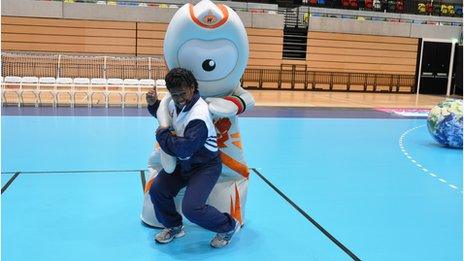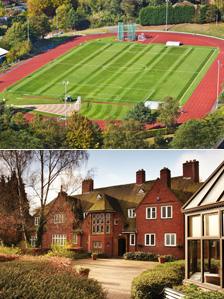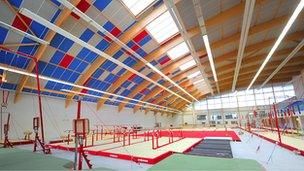London 2012: Why are world's athletes training in UK?
- Published

The UK offers some unique training opportunities...
From Cameroonians in Aberdeenshire to the world's most high profile sprinters in the Midlands, athletes are beating a path to the UK to train ahead of the 2012 Games. Why?
"It took a week to get over the jet lag, but ages to get over the weather," says Sisilia Naisiga Rasokisoki, a striking temporary resident of Kendal in Cumbria.
She is no tourist to the south Lakeland town, but a fighting fit Fijian judoka who garners hellos on the high street and weighs in for her sport in the under-78kg division.
The 32-year-old veteran of the Athens 2004 and Beijing 2008 Games came to the UK amid January snow for a temporary stay.
She is one of hundreds of athletes who will dot themselves around the country for a training camp in the period running up to the London 2012 Olympic and Paralympic Games.
Since the mid-1990s, these camps have increasingly become part of teams' preparation ahead of competition.
Then there are also "holding" or "preparation" camps, which see Olympians gather at sporting bases around the country in the weeks immediately prior to the Games.
None of which should be confused with the opposite end of the Olympic spectrum - <link> <caption>'London Houses'</caption> <altText>Guide to London Houses</altText> <url href="http://www.visitlondon.com/london2012/national-hospitality-houses-for-london-2012" platform="highweb"/> </link> - the hospitality hang-outs at various city locations occupied by National Olympic Committees (NOC) during the Games.
Part of the motivation to move athletes across the globe is the £25,000 London Games organisers Locog will pay every NOC or National Paralympic Committee which brings a team to prepare in a training camp. The smaller the team, the larger the investment incentive.
It is one of the ways Locog hopes to spread the economic and engagement benefit of the Games throughout the country, when athletes and their support staff stay for weeks or months.
In sport-minded cities, towns and institutions, hosting bids have been in the offing since London won the 2012 bid on 6 July 2005.
They have thrown up some surprising twinnings:
<link> <caption>Ghanaian boxers and wrestlers coming to Plymouth</caption> <url href="http://www.bbc.co.uk/news/uk-england-devon-16572411" platform="highweb"/> </link> ;
<link> <caption>Lesotho athletes to Wrexham</caption> <url href="http://www.bbc.co.uk/news/uk-wales-north-east-wales-16607569" platform="highweb"/> </link> ;
<link> <caption>Aberdeen hosting Cameroon</caption> <url href="http://www.bbc.co.uk/news/uk-scotland-north-east-orkney-shetland-16628873" platform="highweb"/> </link> ;
a solitary <link> <caption>Swedish mountain bike competitor in the Scottish borders town of Innerleithen</caption> <url href="http://www.bbc.co.uk/news/uk-scotland-south-scotland-16757099" platform="highweb"/> </link> ;
<link> <caption>Israeli swimmers in Corby</caption> <url href="http://www.bbc.co.uk/sport/0/swimming/12716252" platform="highweb"/> </link> ;
<link> <caption>Cuban boxers in Belfast</caption> <url href="http://www.bbc.co.uk/sport/0/olympics/17612011" platform="highweb"/> </link> ;
<link> <caption>Ukrainian and Belarusian judo players in Tonbridge</caption> <url href="http://news.bbc.co.uk/1/hi/england/kent/8267315.stm" platform="highweb"/> </link> ;
and <link> <caption>Puerto Rican athletes in Canterbury</caption> <url href="http://www.bbc.co.uk/news/uk-england-kent-17616554" platform="highweb"/> </link> .
There are also some major deployments - the might of a <link> <caption>300-strong Chinese squad in Leeds</caption> <url href="http://www.bbc.co.uk/news/uk-england-leeds-14498722" platform="highweb"/> </link> and the world's most famous track teams of <link> <caption>USA and Jamaica heading to Birmingham</caption> <url href="http://news.bbc.co.uk/1/hi/england/west_midlands/8526811.stm" platform="highweb"/> </link> .
But other than the cash carrot, why do National Olympic Committees and teams uproot competitors from their home to travel across continents to train?

Jamaica's athletes will train on the University of Birmingham track and stay within its Conference Park
"Bizarrely," says Sisi's coach and Kendal Judo Club stalwart Mike Liptrott, "Kendal's quite a big name in the Judo world, not just for the mint cake.
"Everyone in the judo world knows about Kendal."
The club dojo (training area) was redeveloped in 2006 and offers Sisi not just a sprung floor to train on but a package of accommodation, physiotherapy, catering and weight management advice.
She can also have coaching on her strength, conditioning and tactics and the opportunity to compete regularly in Europe.
It is a world away from family life in Fiji where she was looking after her 18-month-old-daughter inbetween managing her own training and diet. At camp, there is singularity of purpose in working to achieve her potential at the Games.
"The big difference is that when I'm at home I do everything on my own, there is nobody to push me along," she says.
"Here, the hard training style was a shock. They have sharpened up my judo to make my technique more explosive and more effective.
"It all helps my preparations for the Games."
'Olympic tingle'
A 10-12 day training camp offers coaches and teams the control over variables that is vital for success, says British Cycling's mountain bike coach Phil Dixon.
"It gives you control over where you stay, what kind of weather you expose them to, their training morning and afternoon. It's a perfect environment for moving your athletes on," he says.
"Pre-Olympic Games, a holding camp has coaches, medical, media and logistics teams and mechanical support.
"There are a lot of demands on athletes and it's an effective way of building a world-class environment."
Young athletes move on by training with the older hands. Flying in early to a country irons out niggles over travel, logistics and equipment.
And camps neutralise what Moscow 1980 Olympian Chris Bowles, hosting the Ukrainian and Belarusian judoka at Tonbridge Judo Club, calls the "Olympic tingle".
The pressure and atmosphere is not such a shock to athletes who have seen the venue and adjusted to the time zone.

No matter where Team GB athletes train in the UK, they will drop in to 'prep camp' in Loughborough to pick up their kit
For host cities, the hope is that athletes will pack more than a pinch of Olympic stardust.
The Jamaican and USA track and field teams will be worth about £20m to the Birmingham economy, the city council estimates.
The likes of three-time Olympic gold medal-winning and world record-breaking sprinter Usain Bolt, 100m world champion Yohan Blake and Olympic gold-medallist Asafa Powell will be among a 70-odd strong team of athletes and support staff at the University of Birmingham.
It is the first time the whole athletics team has come together in a camp ahead of a Games.
Team USA will use a city hotel and the international athletics venue, the Alexander Stadium.
The athletics-focused city went out to try to secure the two high-profile teams as soon as London won the bid, says the University's director of sport Zena Wooldridge.
"They are the two blue riband teams of the blue riband Olympic event," she says.
"There's huge excitement, bearing in mind we've got 60,000 Jamaicans living in Birmingham. It's a huge opportunity, but also a big challenge."
No matter where their individual sport trains in the run-up to the Games, British athletes will at some point in June or July check in with Team GB's 'prep camp' at Loughborough University.
Some 3,000 people, including 550 athletes and 450 support staff, will collect their part of 170,000 units of <link> <caption>that Stella McCartney-designed kit</caption> <url href="http://www.bbc.co.uk/news/uk-17457729" platform="highweb"/> </link> .
Just under half of those athletes, from 17 disciplines, will use training facilities set up to familiarise them with the 2012 competition environment - from a 'fake' student crowd cheering the badminton players to the actual mats taekwondo competitors like Sarah Stevenson will use.
At that point of the Olympic cycle it is about managing athletes as they move from their home to the Games environment, while under pressure to produce a lifetime performance at a home Games, says British Olympic Association director of Team GB preparation 2012 Mike Hay.

Team GB gymnasts are heading across the Channel
Meanwhile, as most of the world's athletes zone in on Britain, the gymnast squad in Team GB will instead head to France in May.
When London clinched the bid and the cries of 'Zut Alors!' went up across France, president of Pas-de-Calais Dominique Dupilet hoisted the Union Jack over his county hall.
He saw nearby London 2012 as an opportunity to attract athletes to a region which had suffered industrial decline and was perceived as a backwater by Paris.
The region set about upgrading and rebuilding its gym and its football, boxing, canoeing and wrestling facilities.
This year, 18 different countries will train there before the Games.
Perhaps taking advantage of the new state-of-the-art facilities? Perhaps also in search of some better weather.